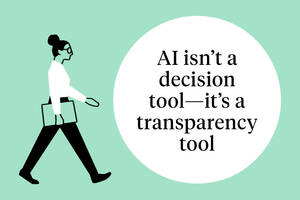Leadership Oct 30, 2020
How to Develop a Leadership Mindset for Uncertain Times
For one, take a page from the hero’s journey to find transformation in adversity.

Lisa Röper
Editor’s note: This is part of a series of articles based on Kellogg Executive Education webinars focused on COVID-19 and crisis management.
These days, Michelle Buck is thinking a lot about leadership.
As a clinical professor of leadership at the Kellogg School, this is not exactly a new topic for her. But as Buck has been thinking about how leaders are dealing with our country’s multiple crises—public health, the economy, racial justice—she keeps returning to four foundational principles of leadership again and again. All of them, she says, feel both timeless and timely right now.
And they are relevant to everyone seeking to lead today, regardless of what it says on their business card.
“Leadership is not a title. Leadership is not a position,” Buck says. “But rather, leadership is a mindset. Leadership is a way of being.”
Buck outlined her four principles in a recent webinar with Kellogg Executive Education.
First, leaders must leverage the power of reflection. While self-reflection has long been in the leader’s toolbox, it is a particularly important tool right now, Buck says, because it can provide stability in a time of so much tumult.
“If everything around us that has been familiar in terms of the status quo is falling apart, we need something to hold onto,” she says. “Our values and purpose can give us consistency.”
Buck recommends that people spend time thinking about their core values and beliefs, as well as the experiences that have shaped those values and beliefs. Additionally, she advises leaders to think about what they want their contributions to be within their sphere of influence in the future.
Next, Buck encourages people to think about how they can generate transformation from adversity. To illustrate this point, she turns to the work of Joseph Campbell, who studied the archetypal “hero’s journey.”
That journey is considered heroic and courageous because it always involves a person stepping into an abyss, into some sort of struggle. Then the hero emerges on the other side having gained insights and wisdom that allow for a transformation.
Buck has noticed that leaders can find this framework helpful because it offers a fresh perspective on their own journey. “We learn that we are not alone when facing challenges,” she says, which “gives a sense of hope.”
Buck’s third pillar is that leaders must create a sense of safety for those around them. She points out that this is distinct from a sense of comfort, because that can stifle creativity, which so often happens outside of our comfort zone.
Creating a sense of safety might mean ensuring that employees feel comfortable speaking up, even if they worry their opinion will be unpopular. This includes letting the people you manage know that you are open to their constructive criticism of you, too.
Cultivating this sense can be particularly challenging for leaders who feel like they simply have no time to spare for those sorts of conversations these days. If that’s the case, Buck advises saying that they can’t dive into that discussion right now, but they want to hear more—and to block off time on their calendars as soon as possible to do that.
“Those sorts of things are noticed,” she says. “They have a big impact.”
Lastly, Buck encourages leaders today to embrace “both/and” thinking as opposed to “either/or.” This lets leaders expand their mindset.
She points out that many of us are likely doing this to some degree already. Perhaps you’re simultaneously feeling very lucky to have a job right now but also very unlucky that your kids can’t go to school. Or you feel like the pandemic has brought out both the best and the worst in people.
In business, this translates into getting beyond zero-sum mindsets to think more broadly about creative solutions, Buck says.
“Resist the temptation to think that there’s only one solution to any challenge we face,” she says.
You can watch the full webinar here and see previous articles from this series here.



